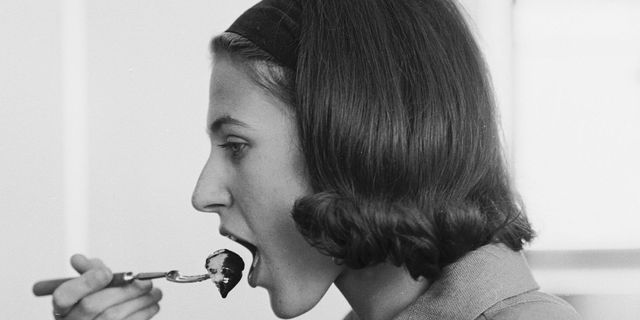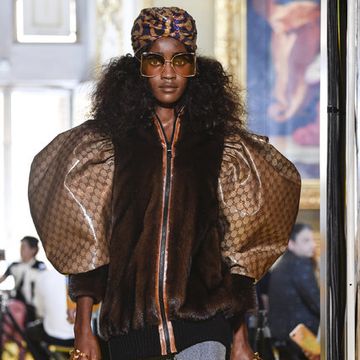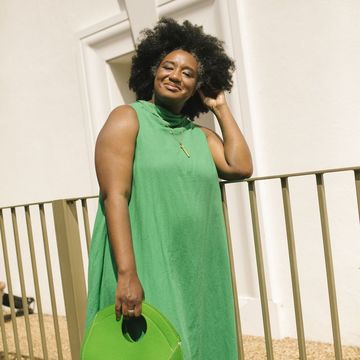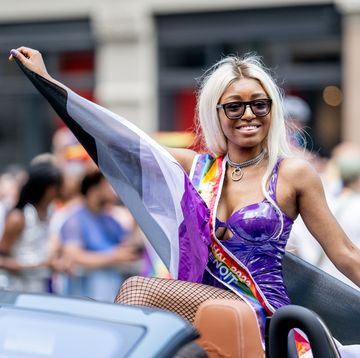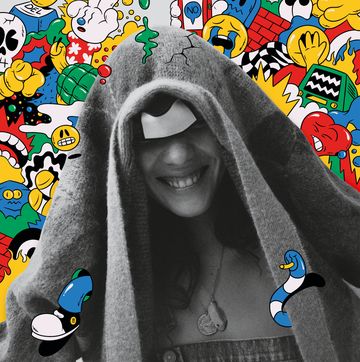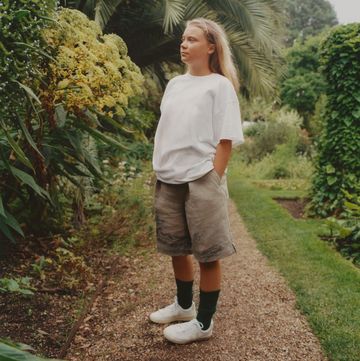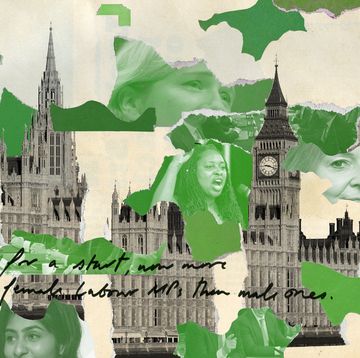I'm standing in my pitch-dark kitchen, holding my fridge door open, bathing in the celestial electronic light.
I am debating whether to eat my housemate's packed-lunch or not.
I'm feeling incredibly sorry for myself and despite some small, petty, gratitude to the universe and my fridge freezer for collaborating on the high-drama lighting that, in my opinion, is lending a spiritual spin on my weedy self-pity, I'm frustrated and furious and exhausted.
Beyond victimisation being a marked personality trait, I am in this moment largely bitter about the fact that I'm awake at 4am.
I cannot sleep. I cannot sleep because I feel guilty.
Not gut-wrenching Shakespearean 'out damned spot' levels of guilt born out of an unforgivable amoral act on my behalf, but because as a 26-year-old woman, I feel constantly stalked by guilt.
For a moment last year I blithely jumped aboard the 'millennial female anxiety' bandwagon that was made trendy by the likes of Lena Dunham and her HBO series GIRLS.
Largely it was credited with lifting the lid on how incredibly confusing being a twenty-something woman, now, is.
Topics like HPV, wether a string vest is ever a good idea and bad-sex, were addressed.
Love it or loathe it, Lena sparked conversations both on and offline about how women are tackling the assault course– social media, year-long-internships, mobile dating – of modern womanhood.
Detractors thrusted large foamy-fingers that read 'narcissism' and 'entitlement' towards Lena and her accomplices but Lena's agenda, to create a warts and all depiction of young cosmopolitan women, was something I could get down with.
Women's mental-health was finally getting air-time.
It felt like overnight we suddenly had Chris Kraus demanding female artists be taken more seriously; Winona Ryder writing about her anxiety and musicians like Kehlani laying bare details of past suicide attempts.
It felt good to see such frankness, but I still couldn't find a description of the feelings that fitted my particular malaise– that of inexplicable guilt about everything and nothing.
When I was 22 years old – the same age Monica Lewinsky was in 1995, when as a White House intern she embarked on an affair with 49-year-old President, Bill Clinton– I became mildly obsessed with her story.
In 2002 Monica hit headlines again, when for the first time, she began to discuss her battle to come to terms with being the one of most humiliated people of the twentieth century.
'I mean, can you imagine the kind of guilt that you would feel…'.
It pained me that I understood exactly why she'd felt guilt, despite feeling deeply, that 'guilt', in the context of that affair was all wrong.
It was imperative for Monica to publicly display guilt and shame as the 'other woman', while Clinton, bar that infamous speech, very much got to continue a normal life.
I had at 22-years-old, already suffered countless run-ins with guilt and had in turn been inadvertently complicit in the shame of other women.
Without ever previously questioning it I suddenly understood guilt to be a congenital part of my life in a way that it was not for my twin brother. And I still feel that.
Often the frequent, daily guilts I harbour seem insignificant.
Let's refer to them as guilt-lite moments.
I get it when I eat chocolate or white bread; when I screen my mum's calls, am hungover around children, get caught bitching, look at my bank statement, make cruel jokes, flirt with dads, eat in bed, Google 'animals with sad eyes', insert my tampons in the middle of my bedroom, when I masturbate, when I get drunk or take drugs at weddings or at christenings and when I 'borrow' my housemate's top and spill Jalfrezi on it.
The larger pangs of guilt come late at night, on comedowns, or when scrolling through my social media feeds and the news and feel, let's say, more 'millennial'.
They arrive when I listen to a podcast about refugees living in tents at a petrol station.
When I see friends buying houses and I know that will not be me anytime soon because I spend money like Imelda Marcos at an LK Bennett sale.
When I think of the likelihood of never being able to financially support my parents as they have me.
When I obsess about my weight and conclude I must be a low-rent feminist.
Exciting stuff, I know, but these thoughts preoccupy lots of my private conversations with friends and, it got me thinking.
The majority of my guilty feelings are knotted up in my status as a millennial and my sex and not so much necessarily in 'reality'.
I spoke to Charted Psychologist, Kimberley Wilson, who explained that 'guilt is our emotional sense that we have breached a social or personal moral boundary', adding 'it is belief that we have done some real or something imagined harm to another'.
Which got me thinking, a history of guilty women has been fed to me since before my feet could reach the floor and might in someway be contributing to this 'imagined' guilt.
Historical, literary and pop manifestations of the guilty woman have been served up as warnings to us.
Eve, Anne Boleyn, Anna Karenina, Wallis Simpson, Angelina Jolie and of course Miss Lewinsky serving as examples, with Freudian guilt, Catholic guilt and mother's guilt popular brands for the types of guilty conscience us women might possess.
Beyond our stereotyping as the more empathetic sex, I imagine our predilection towards guilt may also be rooted in the absurd paradoxes women are supposed to fulfil.
I am criticised if I do not gleefully shovel burgers into my mouth and exalt the joys of junk food.
I'm supposed to be chilled about eating sausage rolls while simultaneously being expected to look, at 26, like Kylie Jenner when I take my clothes off.
It's desirable that I should be able to cook but not be boringly domesticated.
That I should make an effort without being vain, be cool about having meaningless sex but not, at any costs behave like a slut.
I must be opinionated but congenial and successful but never bossy.
I think that somewhere in that hinterland, between being a kid and full blown adult-woman, the strain of juggling these paradoxes causes doubt to spring like mushrooms in the dark and eventually, guilt quietly spreads like dappled fungi, taking over our thoughts and feelings.
As Kimberley sees it 'social and cultural rules that we are exposed to can often come into conflict with our own sense of what feels right or wrong for us' and that can be a painful communion.
I've no doubt that men my age can relate to 'millennial guilt' and that I share with them the core human understanding of feeling guilty (cheating on a partner, behaving maliciously).
I just can't imagine many heterosexual men feel guilty about not feeling paternal as I do about not feeling maternal.
I'm yet to hear my male flat-mate bemoan having eaten a Twix or lamenting a one night stand.
I don't suspect my brother harbours guilty feelings about sending a stern email or thinking he's more attractive than a particular friend of his.
In part I wonder if we don't talk about guilt as openly because of its connotations with shame and regret.
It's just not as easy a topic to broach as anxiety or pubic hair.
Its roots are deeply planted in the human condition in secrecy and punishment.
It's biblical in its enormity and history. See, not as fun, right?
The good news bit now. Guilt is entirely necessary in small doses.
It can be motivational and educational.
'Evolutionary psychologists suggest that guilt plays an important role in the maintenance of strong, stable social structures' according to Kimberley.
'Guilt is not wholly unhealthy. Indeed an absence of guilt is linked to psychopathy so a degree of guilt is essential for good mental health.
It means our capacity for empathy is intact. We can apologise and make reparations, and this can make relationships stronger.'
Now, when I feel the small-guilt creeping up, I ask myself would my twin brother feel guilty if it were him, and not me, eating this second lasagne?
If the answer is 'no', as it most often is, I have a word with myself and remember this isn't guilt I'm living with, it's patriarchal bullshit.
